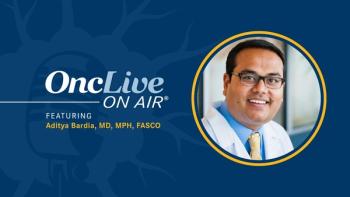
Dr. Gerber on Advances in Radiation Oncology in Breast Cancer
Naamit K. Gerber, MD, assistant professor, Department of Radiation Oncology, NYU Langone’s Perlmutter Cancer Center, discusses advances in radiation oncology in the treatment of patients with breast cancer.
Naamit K. Gerber, MD, assistant professor, Department of Radiation Oncology, NYU Langone’s Perlmutter Cancer Center, discusses advances in radiation oncology in the treatment of patients with breast cancer.
The introduction of a deep inspiration breath hold (DIBH), which moves the heart away from the left breast or chest wall, has been crucial in limiting the heart dose, Gerber says. Patients who undergo this technique are told to take a deep breath which inflates the lungs, creating more distance between the heart and the left breast. This allows radiologists to target the left breast and limit the cardiac dose. The technique is very useful in patients with early-stage breast cancer who need their breast treated, and more advanced disease for patients who need their lymph nodes treated, says Gerber.
The adoption of this technique into practice extends beyond NYU, says Gerber—it is becoming more frequent in practices across the country. Unlike some of the other advances in radiation oncology that get a lot of attention, DIBH is a simple technique with tremendous effects on patient care.


































